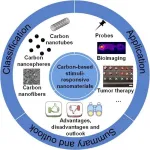(Press-News.org) Serious heart attacks are more likely to happen at the start of the working week than at any other time, according to new research presented today at the British Cardiovascular Society (BCS) conference in Manchester.
Doctors at the Belfast Health and Social Care Trust and the Royal College of Surgeons in Ireland analysed data of 10,528 patients across the island of Ireland (7,112 in the Republic of Ireland, 3,416 in Northern Ireland) admitted to hospital between 2013 and 2018 with the most serious type of heart attack. This is known as an ST-segment elevation myocardial infarction (STEMI) and occurs when a major coronary artery is completely blocked.
The researchers found a spike in rates of STEMI heart attacks at the start of the working week, with rates highest on a Monday. There were also higher rates of STEMI than expected on a Sunday.
Scientists have so far been unable to fully explain why this “Blue Monday” phenomenon occurs. Previous studies suggesting that heart attacks are more likely on a Monday have highlighted an association with circadian rhythm – the body’s sleep or wake cycle.
There are over 30,000 hospital admissions due to STEMI each year in the UK. It requires emergency assessment and treatment to minimise damage to the heart, and this is normally performed with emergency angioplasty – a procedure to re-open the blocked coronary artery.
Cardiologist Dr Jack Laffan, who led the research at the Belfast Health and Social Care Trust, said: “We’ve found a strong statistical correlation between the start of the working week and the incidence of STEMI. This has been described before but remains a curiosity. The cause is likely multifactorial, however, based on what we know from previous studies, it is reasonable to presume a circadian element.”
Professor Sir Nilesh Samani, Medical Director at the British Heart Foundation (BHF), said: “Someone is admitted to hospital due to a life-threatening heart attack every five minutes in the UK, so it’s vital that research continues to shed light on how and why heart attacks happen.
“This study adds to evidence around the timing of particularly serious heart attacks, but we now need to unpick what it is about certain days of the week that makes them more likely. Doing so could help doctors better understand this deadly condition so we can save more lives in future.”
END
Deadly heart attacks more common on a Monday
2023-06-05
ELSE PRESS RELEASES FROM THIS DATE:
Testing for ‘zombie cells’ could boost number of hearts for transplant
2023-06-05
Testing older potential organ donors for dangerous ‘zombie’ cells could help to increase the number of hearts available for transplant, according to research part-funded by the British Heart Foundation (BHF) and presented at the British Cardiovascular Society conference in Manchester.
Currently, hearts from donors aged over 65 are not accepted for donation due to the likelihood of a poor clinical outcome. However, our hearts age at different rates and age isn’t necessarily the best indicator of heart health.
Researchers ...
Whales not to be counted on as ‘climate savers’: study
2023-06-04
Do whales increase the removal of carbon from the atmosphere?
Despite some hope that this would be the case, a new study led by Griffith University and a team of global researchers has found the amount of potential carbon capture by whales is too little to meaningfully alter the course of climate change.
Marine scientist Dr Olaf Meynecke and the team from the Griffith-led Whales and Climate Research Program including Professor Brendan Mackey and Dr Jasper De Bie, reviewed the primary ways in which baleen whales (such as humpback whales) removed atmospheric carbon ...
New drug delays progression of glioma, a deadly brain cancer
2023-06-04
Key takeaways
A targeted therapy drug called vorasidenib had positive results in delaying progression of a specific form glioma, a slow-growing but deadly brain cancer.
In a study of 331 people with the disease, the drug was effective in lengthening the period of time before the patients’ cancer worsened, and with no observed adverse effects.
New treatment approaches for glioma are needed because current treatments, including chemotherapy and radiation, can cause neurological deficits.
In ...
University of Sydney launches innovative research fellowship scheme to tackle global challenges
2023-06-04
An unprecedented investment by the University of Sydney, Australia will support up to 40 new continuing positions, empowering the world’s most talented emerging researchers to undertake innovative research to address some of the biggest challenges of our time.
A $100 million investment and a cornerstone of the University’s 2032 Strategy, the Sydney Horizon Fellowship scheme is the first of its kind in Australia and among the most generous university fellowships in the world.
“The Sydney ...
Real-world data suggests stopping immunotherapy after two years is reasonable in patients with advanced lung cancer
2023-06-04
CHICAGO – Over the past decade, the approval of immune checkpoint inhibitors has revolutionized treatment for patients with advanced lung cancer, helping many live longer lives and improving overall survival for the disease. However, an important question has remained unanswered: How long should a patient with advanced non-small cell lung cancer (NSCLC), who receives immunotherapy as part of their initial treatment, continue with treatment?
A new retrospective cohort study, published today in JAMA Oncology and presented at the 2023 American Society of Clinical Oncology (ASCO) Annual Meeting (Abstract ...
Association of immunotherapy duration with overall survival in advanced non–small cell lung cancer – this study is being released to coincide with a poster presentation at the 2023 ASCO annual meeting
2023-06-04
About The Study: The findings of this study provide reassurance that for patients with advanced non–small cell lung cancer whose disease is still responding to immune checkpoint inhibitor therapy at two years, stopping therapy and monitoring rather than continuing immunotherapy indefinitely is a reasonable strategy with sustained clinical benefit.
Authors: Lova Sun, M.D., M.S.C.E., of the Perelman School of Medicine at the University of Pennsylvania in Philadelphia, is the corresponding author.
To access the embargoed study: Visit our For The Media website at this link https://media.jamanetwork.com/
(doi:10.1001/jamaoncol.2023.1891)
Editor’s ...
The promise of novel FolRα-targeting antibody drug conjugate in recurrent epithelial ovarian cancer
2023-06-03
Presented today by VHIO’s Ana Oaknin at the 2023 ASCO Annual Meeting, 2-6 June (Chicago, IL), updated dose expansion data of the STRO-002-GM1 global phase I study* show promise of FolRα-targeting antibody drug conjugate (ADC) luveltamab tazevibulin in patients with recurrent FolRα-expressing epithelial ovarian cancer.
80% of patients included in this study presented with FolRα expression levels higher than 25%. The overall response rate among these patients was 43.8% in the dose expansion cohort, with a median duration of response ...
Carbon-based stimuli-responsive nanomaterials: classification and application
2023-06-03
Carbon-based stimuli-responsive nanomaterials are gaining much attention due to their versatility, including disease diagnosis and treatment. They work under endogenous (pH, temperature, enzyme, and redox) or exogenous (temperature, light, magnetic field, ultrasound) stimuli. Carbon-based stimuli-responsive nanomaterials can be used as smart materials with dynamically tunable physicochemical properties in response to changes in internal or external environmental stimuli. Their diverse combinations of nanostructures and molecular designs, as well as functional ...
ASCO: Targeted therapy induces responses in HER2-amplified biliary tract cancer
2023-06-03
ABSTRACT: 4008
CHICAGO ― HER2-targeted bispecific antibody zanidatamab demonstrated durable responses in patients with treatment-refractory HER2-positive biliary tract cancer (BTC), researchers from The University of Texas MD Anderson Cancer Center reported at the 2023 American Society of Clinical Oncology (ASCO) Annual Meeting. The study results also were published today in The Lancet Oncology.
In the first cohort of the global Phase II HERIZON-BTC-01 trial, which included 80 patients with HER2-positive tumors, the confirmed objective response rate (cORR) was 41% with a median duration of response (DOR) of 12.9 months at a median follow-up of 12.4 months. ...
Children with drug-resistant epilepsy live longer after cranial surgery
2023-06-03
Survival rate beyond 10 years in children with drug-resistant epilepsy (DRE) was highest after cranial epilepsy surgery and lowest when treated only with antiseizure medications, according to a study published in The Lancet Child and Adolescent Health. This large, retrospective study was the first to compare long-term survival in children with DRE among cohorts treated with medications only, vagus nerve stimulation plus medications, and cranial epilepsy surgery plus medications. Results show that risk of early death was reduced by over 80 percent after surgery and by 40 percent after ...



